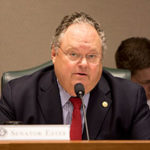One of the growing experiences pastors will go through is leaving a church and watching the church call a new pastor. I’ve experienced this twice and am grateful that both times have been positive experiences.
Reflecting back, I’ve learned something that I believe is important for every pastor to consider: every pastor needs to serve with the next pastor in mind.
This is not always easy. It is easier to focus on the daily tasks. It is easier to think primarily about one’s own legacy. It is easier, in other words, to forget that there will be a day when the pastor is no longer there, the church will move forward, and a new pastor will be called.
Nevertheless, if pastors truly care about their churches, they must think beyond themselves to the time when another pastor will succeed them. In my experience, I’ve learned a few lessons that I hope pastors will find helpful.
Four ways pastors can succeed in succession
1. Leave the church healthier than when you arrived.
I remember someone once told me, “Ross, you’ll leave every church you pastor stronger in some areas and weaker in some areas.” It’s humbling to hear this, but it is true.
The reality is that there will be areas of weakness when any pastor leaves, but the focus needs to be on leaving the church in a healthier place than when we began.
2. Do not “kick the can down the road” on important issues that need to be addressed.
It can be challenging to address important areas of discomfort and conflict. The temptation is to ignore these areas and leave them for someone else to address. If one of the goals, though, is to leave a church healthier, certain areas of discomfort and conflict will have to be addressed.
I remember one of the challenges in my first church was to have to lead the church to stand up to what can best be described as a “church bully.” It was a hard and anxiety-ridden time to stand up to the person, but I was thankful that my successors never had to address the same person/issue.
3. Set the standard for the pastor and church relationship.
The reciprocal relationship between pastors and churches is crucial for the health and growth of the church. The health of this relationship, or lack thereof, can impact a church for generations. Therefore, it is not only important for the current pastors to model biblical servant leadership for their time at the church but also for the pastors who follow.
Sign up for our weekly edition and get all our headlines in your inbox on Thursdays
For example, it is important for pastors to neither be pushovers or dictators. Either of these extremes causes sickness in churches and fosters disrespect for the office of the pastor.
When a pastor, though, seeks to lead with godliness, a God-exalting vision, a willingness to apologize when wrong, service, a love for people and hard work, the health that is fostered between the church and pastor can provide a solid foundation and legacy of health for successive pastors.
4. Talk about your predecessors the same way you hope your successors will talk about you.
It is easy to look back and see how one would do things differently. There will also be people in the church who criticize the previous pastor and flatter the current pastor.
It’s tempting to scorn humility and accept it as truth. The better way, however, is to redirect the conversation and find ways to build up one’s predecessor.
Ultimately, pastoring with the next pastor in mind is done within the context of the biblical belief that the head of the church is Christ. The church does not belong to a pastor (or the membership).
Pastors are stewards of Christ’s church, and there will be pastors who follow us. Therefore, let’s keep our call as stewards at the fore as we lead toward health, keeping in mind the call of those who inevitably follow.
Ross Shelton is senior pastor of First Baptist Church in Brenham, Texas.














We seek to connect God’s story and God’s people around the world. To learn more about God’s story, click here.
Send comments and feedback to Eric Black, our editor. For comments to be published, please specify “letter to the editor.” Maximum length for publication is 300 words.